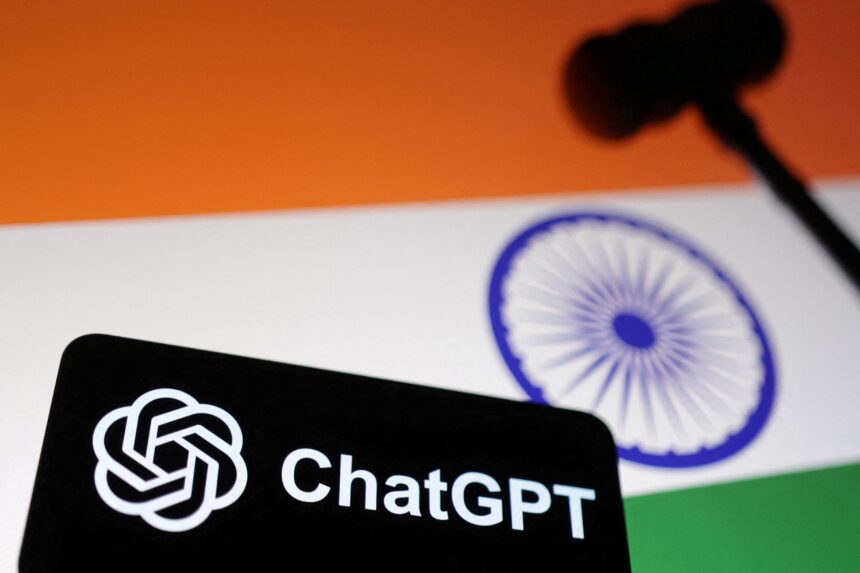India’s largest news outlets are attempting to join the bandwagon by suing Open AI, the US startup behind ChatGPT, for alleged unauthorized use of their news content.
The news organizations include some of India’s oldest publications, such as The Indian Express, The Hindu, The India Today group, billionaire Gautam Adani’s NDTV, and more than a dozen others.
OpenAI denies the allegations, telling the BBC that it uses “publicly available data” by “widely accepted legal precedents”.
OpenAI CEO Sam Altman visited Delhi on Wednesday to meet with IT Minister Ashwini Vaishnaw and discuss India’s plans for a low-cost AI ecosystem.
He stated that India “should be one of the leaders of the AI revolution” and that his previous comments from 2023, in which he stated that Indian firms would struggle to compete, were taken out of context.
“India is an incredibly important market for AI in general, and OpenAI in particular,” he told local media at the event.
Asian News International (ANI), India’s largest news agency, filed a legal case against OpenAI in November, the first of its kind in India.
ANI accuses ChatGPT of using copyrighted material illegally, which OpenAI denies, and seeks damages of 20 million rupees ($230,000; £185,000).
The case is significant for ChatGPT because it plans to expand in the country. According to a survey, India currently has the largest ChatGPT user base.
Chatbots such as ChatGPT are trained using massive datasets gathered by crawling the internet. India’s nearly 450 news channels and 17,000 newspapers produce a wealth of content for this purpose. However, it is unclear what materials ChatGPT can legally collect and use.
Open AI ChatGPT Under Fire
OpenAI is facing at least a dozen lawsuits worldwide filed by publishers, artists, and news organizations alleging ChatGPT of using their content without permission.
The New York Times filed the most prominent of them in December 2023, demanding “billions of dollars” in damages from OpenAI and its backer, Microsoft.
“A decision by any court would also hold some persuasive value for other similar cases around the world,” says Vibhav Mithal, an artificial intelligence lawyer at the Indian law firm Anand and Anand.
Mr Mithal stated that the outcome of ANI’s lawsuit may “define how these AI models will operate in the future” and “what copyrighted news content can be used to train AI generative models [like ChatGPT]”.
A court ruling in ANI’s favour could spark additional legal cases and open the door to AI companies entering into license-sharing agreements with content creators, as some have already begun doing.
In India, nearly 450 news channels and 17,000 newspapers produce content that has tremendous potential for ChatGPT.
“But a ruling in Open AI’s favour will lead to more freedom to use copyrighted protected data to train AI models,” he claimed.
ANI delivers news to paying subscribers and holds exclusive copyright to a large text, images, and video archive.
According to ANI’s suit in the Delhi High Court, Open AI used its content to train ChatGPT without permission. ANI has argued that this improved the chatbot and benefited OpenAI.
Media’s Credibility and Public Perception
The news agency stated that before filing the lawsuit, it informed Open AI that its content was being used illegally and offered to grant the company a license to use its data.
According to ANI, OpenAI declined the offer and added the news agency to an internal blocklist, preventing data collection. It also asked ANI to turn off certain web crawlers to prevent ChatGPT from picking up its content.
According to the news agency, despite these measures, ChatGPT obtains its content from the websites of its subscribers. This has “unjustly” enriched Open AI, it claims.
ANI also claims in its suit that the chatbot generates content verbatim for specific prompts. According to ANI, ChatGPT has sometimes falsely attributed statements to the news agency, undermining its credibility and misleading the public.
In addition to seeking compensation for damages, ANI has asked the court to order Open AI to stop storing and using its work.
In its response, OpenAI states that it opposes the case being filed in India because the company and its servers are not located there, and the chatbot was not trained there.
ChatGPT Impacting Journalists’ Livelihoods
In December, the Federation of Indian Publishers, which claims to represent 80% of Indian publishers, including the Indian offices of Penguin Random House and Oxford University Press, filed a court application claiming that they were “directly affected” by this case and should be allowed to present their arguments.
A month later, the Digital News Publishers Association (DNPA), representing major Indian news organizations, and three other media outlets submitted a similar application.
They argued that while OpenAI had licensing agreements with international news publishers such as the Associated Press and Financial Times, a similar model had not been implemented in India.
The DNPA told the court that the case would impact journalists’ livelihoods and the country’s news industry. However, Open AI has argued that chatbots are not a “substitute” for news subscriptions and are not used for this purpose.
The court has not yet admitted the publishers’ applications, and OpenAI has argued that it should not hear them.
However, the judge clarified that even if these associations can argue, the court will only consider ANI’s claims because the other parties have not filed their lawsuits.
Can India Regulate AI
Meanwhile, Open AI told the BBC that it is in “constructive partnerships and conversations” with news organizations worldwide, including India, to “work collaboratively.”
According to the Digital News Publishers Association, the case would impact journalists’ livelihoods and the entire national news industry. Analysts believe the lawsuits filed against ChatGPT worldwide will expose aspects of chatbots that have previously escaped scrutiny.
Dr Sivaramakrishnan R Guruvayur, whose research focuses on the responsible use of artificial intelligence, believes that the data used to train chatbots is one such aspect. According to him, the ANI-OpenAI case will prompt the court “to evaluate the data sources” of chatbots.
Governments worldwide have been debating how to regulate AI. In 2023, Italy blocked ChatGPT, citing concerns about the chatbot’s mass collection and storage of personal data.
Last year, the European Union approved a law to regulate artificial intelligence.
The Indian government has also indicated plans to regulate artificial intelligence. Before the 2024 election, the government issued an advisory stating that AI tools that were “under-testing” or “unreliable” should seek government approval before launch.
It also requested that AI tools not generate illegal responses in India or “threaten the integrity of the electoral process”.
Related News:
Open AI Seeks $40 Billion in Funding

Geoff Thomas is an award winning journalist known for his sharp insights and no-nonsense reporting style. Over the years he has worked for Reuters and the Canadian Press covering everything from political scandals to human interest stories. He brings a clear and direct approach to his work.














